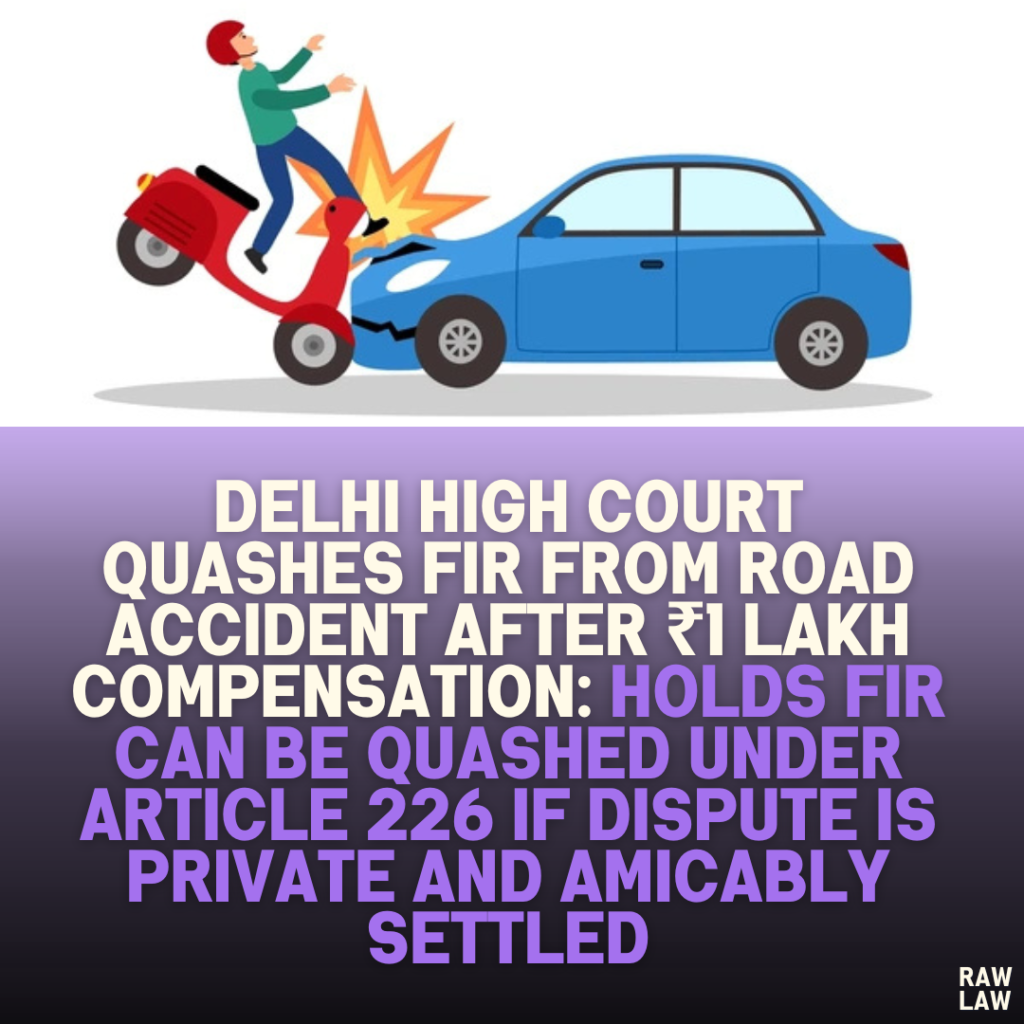Court’s Decision
The Delhi High Court allowed the writ petition filed under Article 226 of the Constitution read with Section 528 of the Bhartiya Nagarik Suraksha Sanhita, 2023, and quashed FIR No. 99/2025 registered under Sections 281 and 125(A) of the BNS at P.S. Dwarka South. The Court observed that the matter had been amicably settled between the parties and held:
“No useful purpose will be served in continuing with the present FIR… and all the other consequential proceedings emanating therefrom.”
Facts
The case arose from a road accident reported on 13.02.2025 at 12:45 AM near Grace Hospital, Sector-8, Dwarka, involving a Hero Passion Pro motorcycle and a Honda Brio car. The injured person, identified as Imran, was admitted to Indira Gandhi Hospital and found unfit to give a statement. Consequently, FIR No. 99/2025 was registered under Sections 281 and 125(A) of the BNS based on the medical report and spot inspection.
During the pendency of the proceedings, both parties entered into a written settlement dated 08.04.2025, wherein the petitioner agreed to pay ₹1,00,000 as compensation. The Joint Registrar recorded their statements on 21.04.2025, affirming the voluntary nature of the settlement.
Issues
- Whether FIR No. 99/2025 under Sections 281 and 125(A) BNS should be quashed on the basis of a private settlement between the parties.
Petitioner’s Arguments
The petitioner submitted that the dispute was of a personal nature and had been amicably resolved. It was argued that the continuation of criminal proceedings would serve no fruitful purpose and would amount to an abuse of the process of law.
Respondent’s Arguments
Respondent No. 2 appeared in person before the Court and acknowledged receipt of the ₹1,00,000 compensation via bank draft. It was stated that the compromise was executed voluntarily, without any force or coercion. Respondent No. 2 had no objection to quashing the FIR and the consequential proceedings.
Analysis of the Law
The Court evaluated the matter in light of the powers conferred under Article 226 of the Constitution and Section 528 of the BNSS, 2023. It considered the fact that the parties had settled their dispute amicably and that the prosecution of the FIR would no longer serve any judicial purpose.
Precedent Analysis
The Court referred to the Supreme Court’s decision in Gian Singh v. State of Punjab (2012) 10 SCC 303, where it was held:
“The High Court must consider whether it would be unfair or contrary to the interest of justice to continue with the criminal proceedings… and whether to secure the ends of justice, it is appropriate that criminal case is put to an end…”
This precedent was applied to reinforce the legitimacy of quashing proceedings that arise from settled disputes of a personal nature.
Court’s Reasoning
Justice Ravinder Dudeja recorded that both parties appeared before the Court and confirmed the terms of the settlement. The Court found the settlement to be genuine, voluntary, and free from coercion. Further, the Investigating Officer verified the identity of the parties and raised no objections. The Additional Public Prosecutor also stated that the State had no objection to the FIR being quashed in light of the settlement.
Conclusion
The Court concluded that since the dispute had been amicably resolved and further proceedings would not serve any useful purpose, it was just and appropriate to quash the FIR and all consequential proceedings. The petition was accordingly allowed and disposed of.
Implications
This judgment reaffirms the power of High Courts under Article 226 and Section 528 BNSS to quash criminal proceedings in cases involving private disputes that have been settled amicably. It also highlights the Court’s preference to encourage compromise in appropriate cases to avoid the rigours of prolonged litigation, especially where the alleged offence is not of a heinous nature.




Pingback: Delhi High Court Holds Waiver Under Section 12(5) Must Be Post Appointment of Arbitrators: “No-Objection Given Prior to Knowing Arbitrators’ Identities Is No Waiver in the Eyes of Law” - Raw Law
Pingback: Delhi High Court Sets Aside GST Adjudication Order for No Reply and Lack of Personal Hearings: "Petitioner to Be Provided Opportunity to Be Heard on Merits, Matter Remanded to Adjudicating Authority" - Raw Law